九年级Unit 10 You’re supposed to shake hands.单元复习课件(96张PPT)
文档属性
| 名称 | 九年级Unit 10 You’re supposed to shake hands.单元复习课件(96张PPT) |
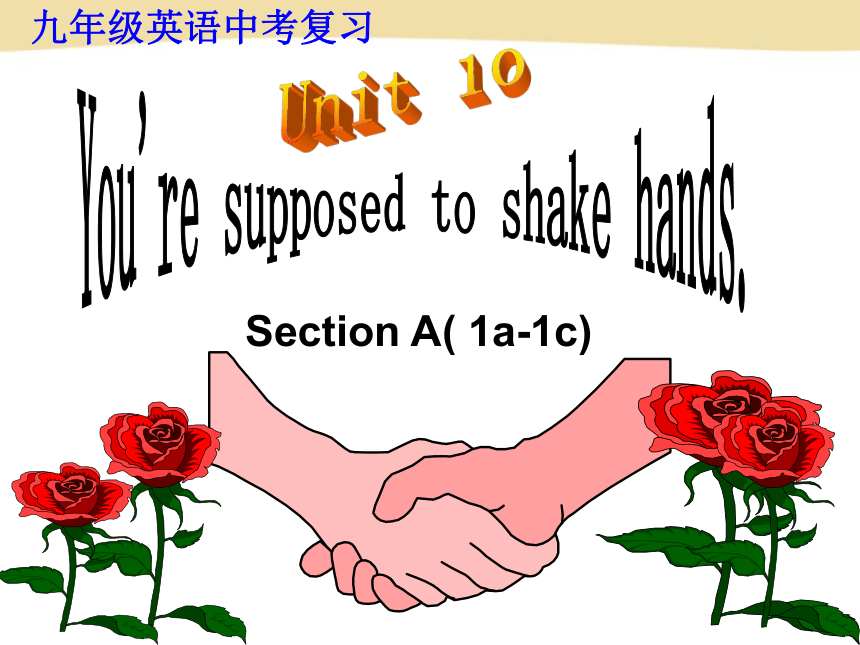
|
|
| 格式 | zip | ||
| 文件大小 | 5.0MB | ||
| 资源类型 | 教案 | ||
| 版本资源 | 人教新目标(Go for it)版 | ||
| 科目 | 英语 | ||
| 更新时间 | 2019-02-14 00:00:00 | ||
图片预览

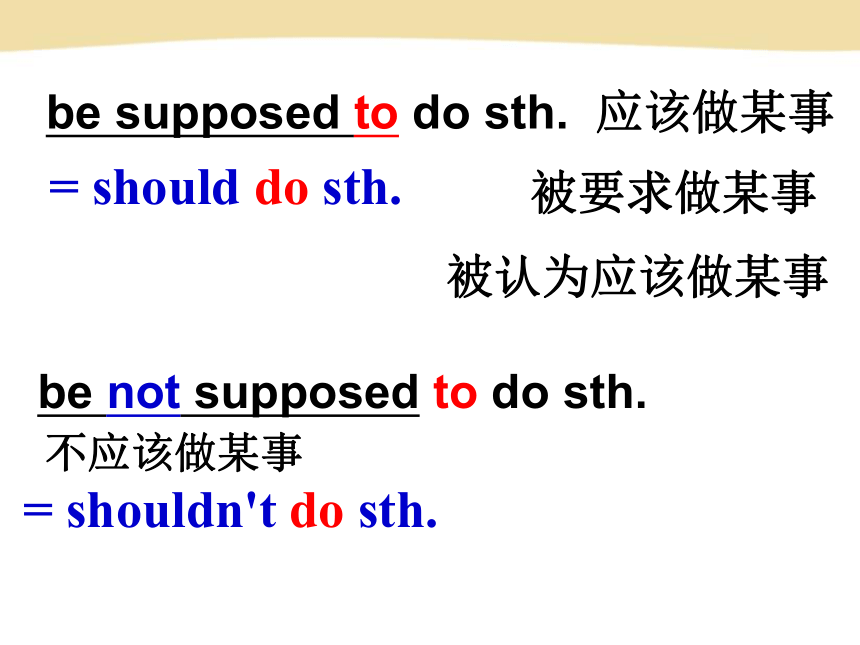
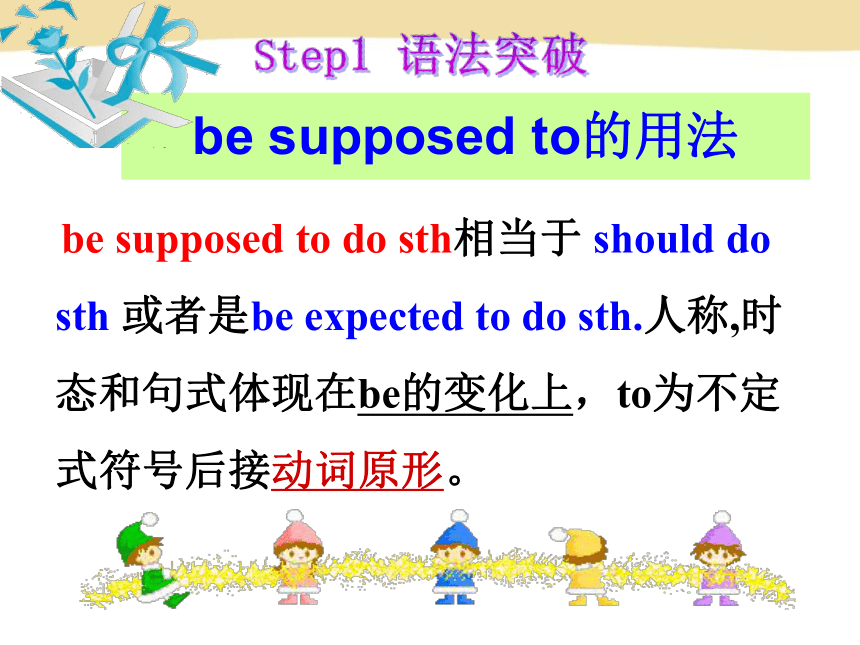
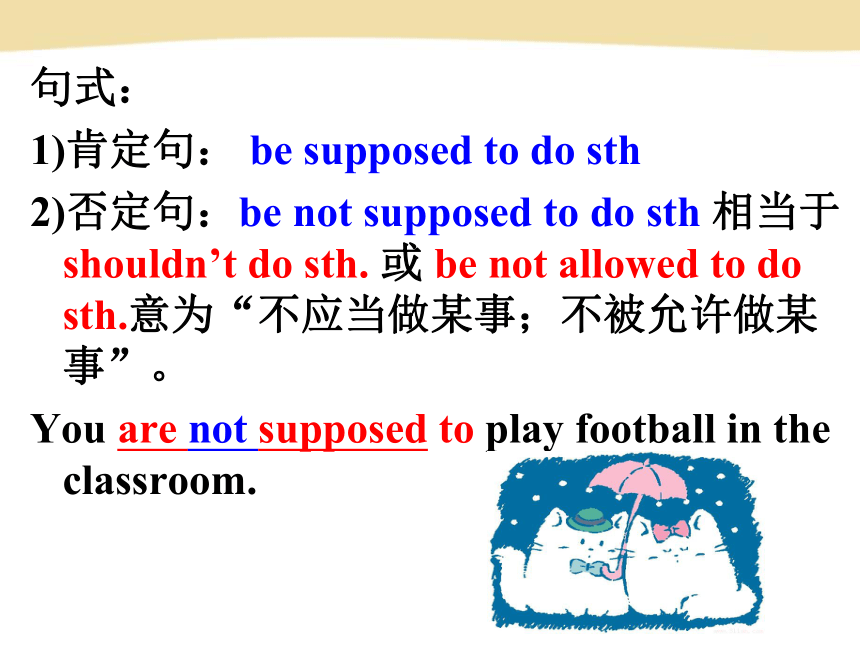
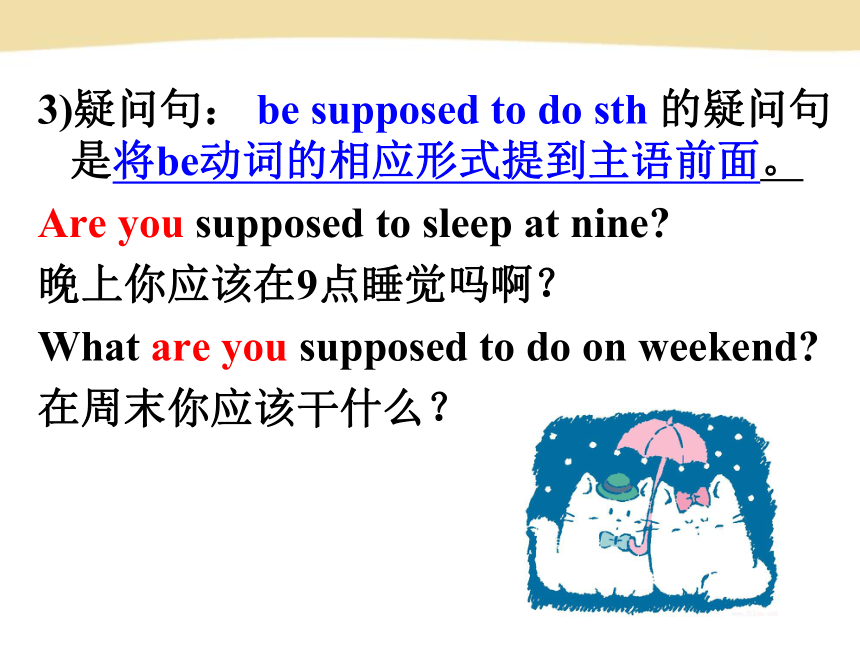
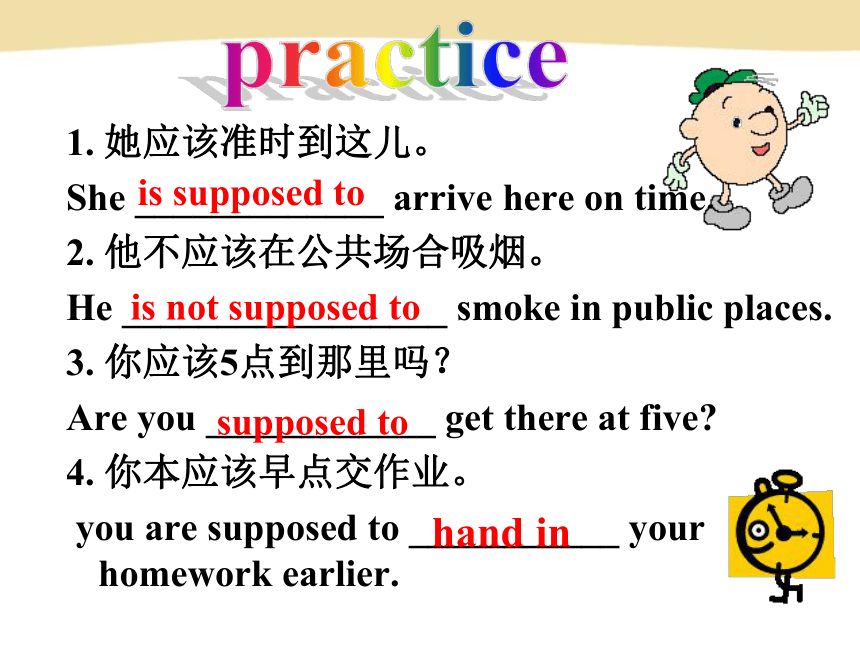
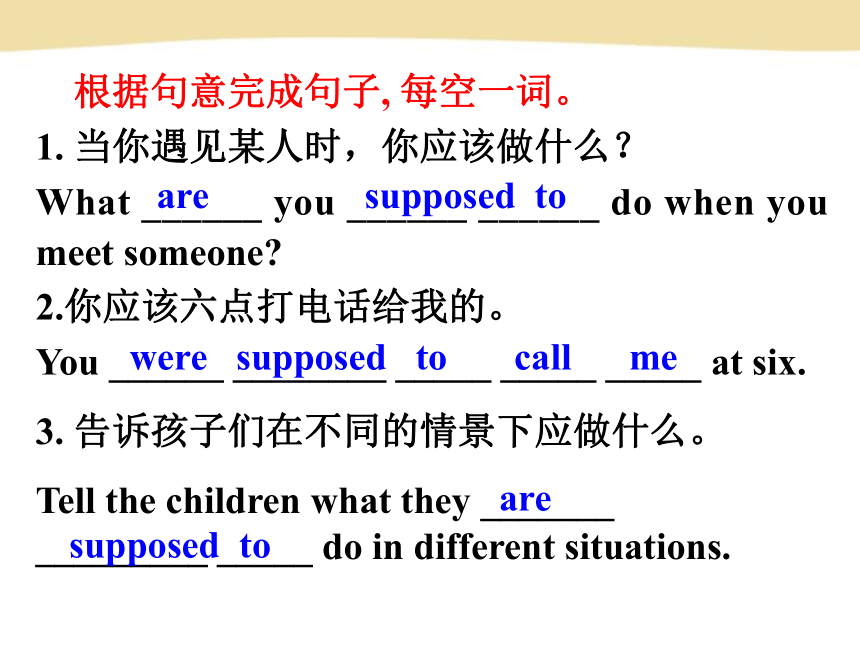
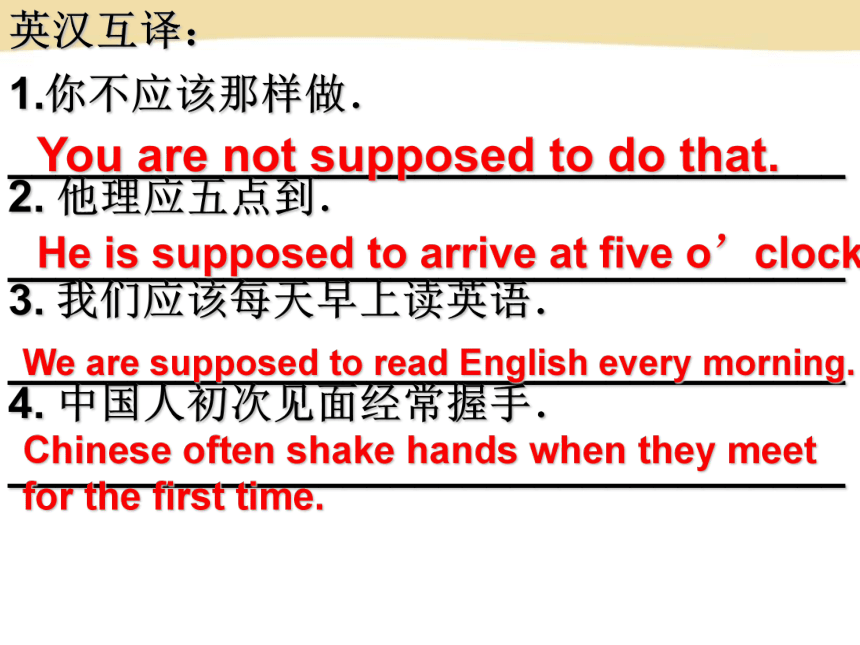
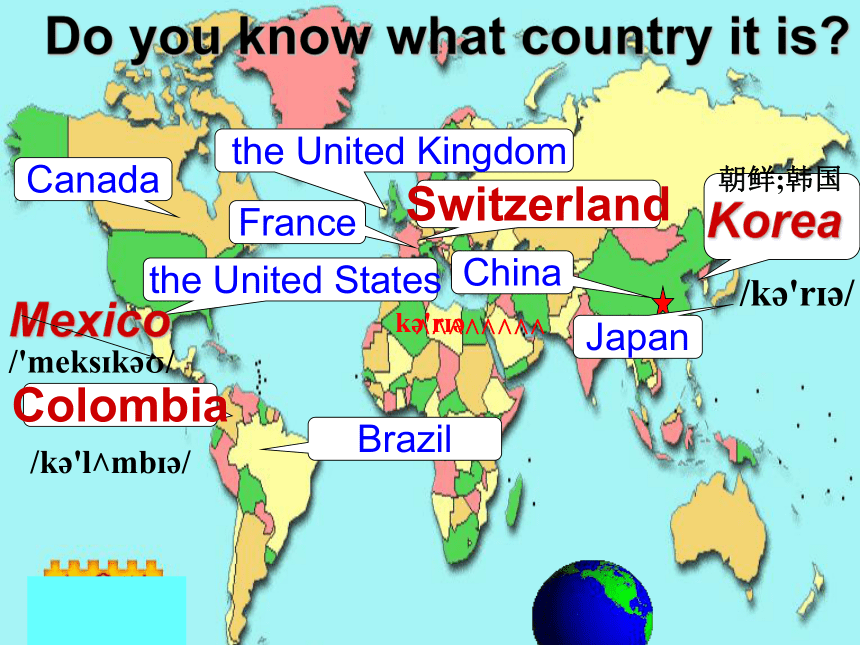

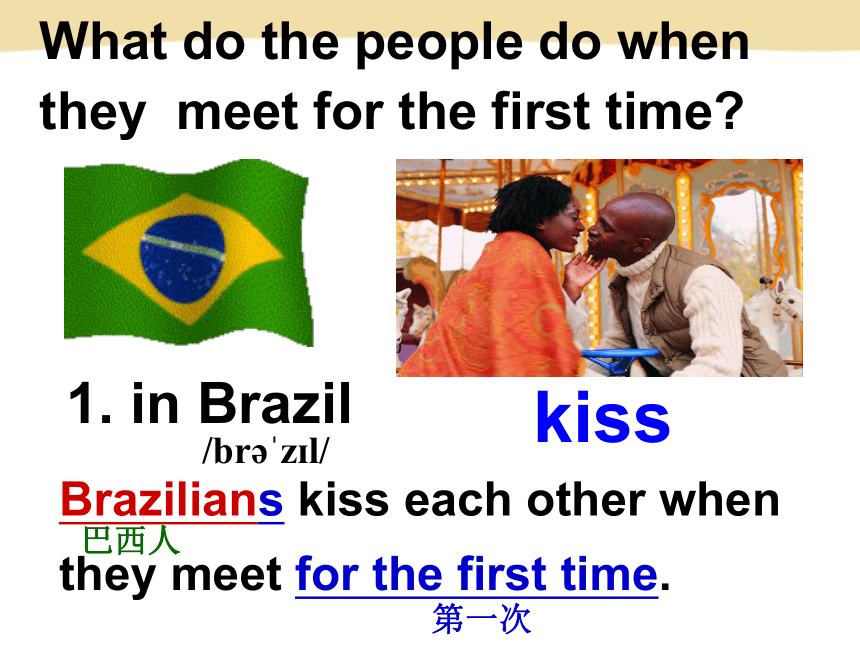
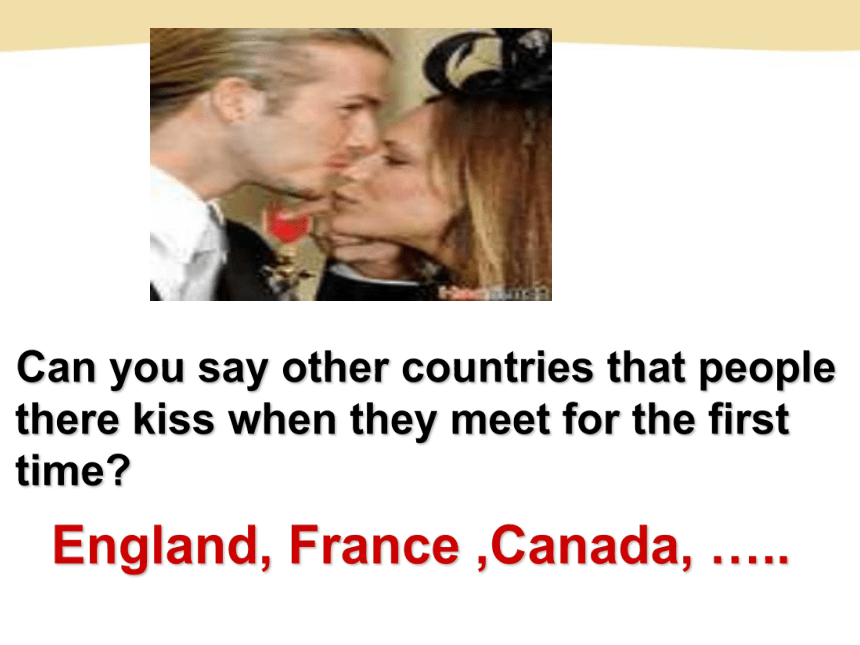
文档简介
Section A( 1a-1c)
九年级英语中考复习
be supposed to do sth. 应该做某事
被要求做某事
被认为应该做某事
be not supposed to do sth.
不应该做某事
= should do sth.
= shouldn't do sth.
be supposed to的用法
be supposed to do sth相当于 should do sth 或者是be expected to do sth.人称,时态和句式体现在be的变化上,to为不定式符号后接动词原形。
句式:
1)肯定句: be supposed to do sth
2)否定句:be not supposed to do sth 相当于shouldn’t do sth. 或 be not allowed to do sth.意为“不应当做某事;不被允许做某事”。
You are not supposed to play football in the classroom.
3)疑问句: be supposed to do sth 的疑问句是将be动词的相应形式提到主语前面。
Are you supposed to sleep at nine?
晚上你应该在9点睡觉吗啊?
What are you supposed to do on weekend?
在周末你应该干什么?
1. 她应该准时到这儿。
She _____________ arrive here on time.
2. 他不应该在公共场合吸烟。
He _________________ smoke in public places.
3. 你应该5点到那里吗?
Are you ____________ get there at five?
4. 你本应该早点交作业。
you are supposed to ___________ your homework earlier.
is supposed to
is not supposed to
supposed to
hand in
根据句意完成句子, 每空一词。
1. 当你遇见某人时,你应该做什么?
What ______ you ______ ______ do when you meet someone?
2.你应该六点打电话给我的。
You ______ ________ _____ _____ _____ at six.
3. 告诉孩子们在不同的情景下应做什么。
Tell the children what they _______ _________ _____ do in different situations.
are
supposed to
were supposed to call me
are
supposed to
英汉互译:
1.你不应该那样做.
___________________________________2. 他理应五点到.
___________________________________3. 我们应该每天早上读英语.
___________________________________4. 中国人初次见面经常握手.
___________________________________
You are not supposed to do that.
He is supposed to arrive at five o’clock.
We are supposed to read English every morning.
Chinese often shake hands when they meet for the first time.
China
the United States
Canada
the United Kingdom
Brazil
Japan
France
Do you know what country it is?
Mexico
Korea
Colombia
Switzerland
k?'r??
/k?'r??/
/'meks?k??/
/k?'l?mb??/
????????
朝鲜;韩国
Different countries have
different customs.
习惯, 风俗
What do the people do when they meet for the first time?
1. in Brazil
kiss
Brazilians kiss each other when
they meet for the first time.
/br??z?l/
第一次
巴西人
Can you say other countries that people there kiss when they meet for the first time?
England, France ,Canada, …..
2. In the United States what do the people do when they meet for the first time?
shake hands
They are supposed to ...
3. In Mexico what do the people do when they meet for the first time?
shake hands
在墨西哥
They are supposed to ...
4. In Japan what do the people do when they meet for the first time?
bow
They are supposed to ...
5. In Korea what do the people do when they meet for the first time?
bow
在韩国
They are supposed to ...
What are you supposed to do when
you meet him for the first time?
What are they doing?
hug
拥抱
- I am supposed to hug when I meet him for the first time.
-They are hugging.
If you meet someone in the following countries, what are you supposed to do? Please show your ideas.
Talent show:
Canada
Mexico
Brazil
kiss
kiss
shake hands
shake hands
bow
shake hands
bow
China
Korea
America
Japan
A:What are you supposed to do at
school?
B:We’re supposed to be on time,
but we’re not supposed to be late.
在学校里你应该做什么?
1.be on time be late
2.be hard-working be lazy
3.eat in the dining-hall eat in the classroom
What are the table manners in China?
餐桌礼仪
Table Manners 餐桌礼仪
You are supposed to pick up your bowl of rice.
端起你的饭碗
Table Manners
You’re not supposed to eat with your hands.
用手吃东西
Table Manners
You’re not supposed to talk at the table.
在餐桌旁
You are not supposed to stick your
chopsticks into the food.
stick ....into...把...插到...中
筷子
Table Manners
The youngest person is not supposed to start eating first.
start doing / to do sth. 开始做某事
In Japan, you are supposed to make noise while eating noodles. It shows that you like the food.
发出声音
1、谁的_________ 2、卡车;货车___________
3、 野餐________ 4、兔;野兔____________
5、出席;参加__________ 6、任何人____________
7、声音;噪音________ 8、男警察_______________
9、狼________ 10、实验室_______________
11、外套:外衣_________ 12、困倦的;瞌睡的_______
13、着陆;降落_____________
14、西服;套装;适合_ ____________
15、表示;表达_____________
whose
picnic
truck
rabbit
attend
noise
anybody
policeman
wolf
laboratory
coat
sleepy
land
suit
express
16、圆圈;圈出________ 17、大不列颠__________
18、接受;收到________ 19、领导;领袖____________
20、医疗的;医学的________ 21、目的;目标_________
22、阻止;阻挠________ 23、力量;精力________
24、位置;地方________ 25、胜利;成功____________
26、敌人;仇人_________ 27、一段时间;时期_______
28、工作努力的;辛勤的______________________
circle
receive
Britain
leader
medical
prevent
purpose
energy
position
victory
enemy
period
hard-working
society _____________(形容词)
choice______________(动词)
policeman__________________(对应词)
wolf____________(复数)
energy_______________(形容词)
manage_______________(名词)
leader_______________(动词)
medical______________(名词)
express______________(名词)
noise ___________(形容词)
enemy___________(复数)
value___________(形容词)
social
choose
policewoman
wolves
energetic
manager
lead
medicine
expression
noisy
enemies
valuable
1、属于______________
2、捡起_____________________
3、走开__________________________
4、看起来像____________________
5、首先;起初_____________________
6、太多____________________
7、愉快做某事___________________________
8、 过去常常_______________________
belong to
pick up
go away
look like
at first
too much/many
have fun doing sth.
used to
9、确定_________________________
10、在野餐时____________________
11、制造噪音_____________________
12、一些有价值的东西_______________
13、感到困倦_____________
14、一定在做某事______________________
15、可能再做某事____________________
16、不但…而且…_______________________
17、 超过________________________
18、 与…交流_________________________
19、以某种方式_____________________
be sure
at the picnic
make (a) noise
something valuable
feel sleepy
must be doing sth.
may/might/could be doing sth.
not only…but also…
more than
communicate…with…
in a certain way
20、上班迟到__________________
21、一群_______________________
22、追逐;追赶__________________
23、阻止某人做某事_____________________
24、总是在做某事_____________________
25、 在网球队______________________
26、去野餐______________________
be late for work
a group of
run after
prevent sb. from doing sth.
be always doing sth.
on the tennis team
go to a picnic
27、一些不寻常的事__________________
21、一些奇怪的事______________________
22、逃跑__________________
23、 走开_____________________
24、 一定有某人在做某事__________________
25、穿着西装____________________
26、 指出______________________
something unusual
something strange
run after
go away
There must be doing sth.
wear a suit
point out
Review:
Translate the phrases:
1. 对...随意/宽松
be relaxed about
2. 匆忙
rush around
3. 迟点到达
arrive a bit late
4. 慢慢享受我们的时间
enjoy our time slowly
5. 珍惜时间
value the time
6. 与某人共度时光
spend time with sb.
7. 顺便拜访
drop by
8. 制定计划
make plans
9. 计划做某事
plan to do sth.
10. 到处走走
walk around
11. 尽可能...
as...as one can/could
12. 准时
on time
13. ...的首都
the capital of...
14. 毕竟;终究
after all
15. 邀请某人做某事
invite sb. to do sth.
16. 在中午
at noon
17. 变得生气
get mad
18. 努力做某事
make an effort to do sth.
19. 避免交通拥挤
avoid heavy traffic
20. 使某人一直做某事
keep sb. doing sth.
21. 没有做某事
without doing sth.
22. 一些有趣的事
something interesting
23. 一起去某地
go somewhere together
Translate the phrases.
to one’s surprise
令某人惊奇的是
握手
迟到
shake hands
arrive late
wear the wrong clothes
穿错衣服
犯一些错误
make some mistakes
welcome party
欢迎会
伸出手
hold out one’s hands
以错误的方式
in the wrong way
一...就...
as soon as
Role-play the conversation.
Katie: How was the welcome party for
foreign students last night?
John: Great! I made some new friends. But a
funny thing happened.
Katie: What?
John: I met a Japanese boy called Sato, and
as soon as I held out my hand, he
bowed.
2d
欢迎晚会
交朋友
meet-met-met
被叫做
左藤
一...就...
伸出;递出
*as soon as 引导的时间状语从句要采用"主将从现"的原则.如:
I'll tell you as soon as he arrives here.
Katie: That’s how people in Japan are expected
to greet each other. It’s impolite if you
don’t bow.
John: I didn’t know that. So I just stood there
with my hand out. Finally, I returned the
bow.
被期望...
互相问候
粗鲁的;无礼的
伸着手
站
还了礼
stand-stood-stood
Katie: I remember when I first met Marie last
year, I did the same thing. I held out
my hand and to my surprise, she kissed
me on both sides of my face!
John: I wouldn’t mind that!
Katie: Very funny. Later I found out French
people are supposed to kiss when they
see each other.
伸出手
使我感到吃惊的是...
亲吻了我的双颊
发现
Let’s learn some
language points
Language points
1) be expected to 意为“被期望;被要求”。
she is expected to be a good doctor.
有人期望她成为一名好医生。
The visitors are expected to arrive in half
an hour.
参观者要在半小时后到达。
2) as soon as 意为“一…就…”,引导时间状语从句,若主语用一般将来时,从句用一般现在时表将来;若主句用过去式,从句也要用过去时。
I will call you as soon as I get to Shanghai .
我一到上海就给你打电话。
As soon as I went in, he cried out with pleasure.
我一进门他就高兴地叫起来。
3) hold out 意为“伸出;递出”。
I held out my hand to catch the box.
我伸出手去接那个盒子。
4) shake hands 意为“握手”,表达“与某人握手”用 shake hands with sb.。
The singer shook hands with her fans in the concert yesterday.
昨天的音乐会结束后,明星与他的粉丝们握手。
shake 动词,意为“摇晃;抖动”,其过去式和过去分词分别为shook和shaken。
At last, he shook his head and refused.
最后,他摇摇头拒绝了。
5) bow动词,意为“鞠躬;弯腰”,常与
to/before 连用,意为“向…鞠躬”。
He bows for his thanks.
他鞠躬致敬。
The boy bowed to his teacher.
这个男孩向他老师鞠躬。
Read the following opinions of a
Colombian and a Swiss student . In which
Country is it OK to be 15 minutes late for
dinner?
Colombia
Switzerland
3a
观点
哥伦比亚
瑞士
/k?'l?mb??/
哥伦比亚
['sw?ts?l?nd]
瑞士
Where I’m from, we’re pretty relaxed about time.
We don’t like to rush around, so we don’t mind if
people are a little late sometimes. If you tell a
friend you’re going to their house for dinner, it’s
OK if you arrive a bit late. We like to enjoy our
time slowly. We value the time we spend with
our family and friends in our everyday lives.
Teresa Lopez
Cali, Colombia
特蕾莎.洛佩斯
卡利,哥伦比亚
在我们那个地方
对...很随意
匆忙
迟一点
迟一点到达
慢慢享受我们的时间
珍惜
We often just drop by our friends’ homes if
we have time. We don’t usually have to
make plans to meet our friends.When we
see each other, it’s polite for boys to shake
hands and for girls to kiss each other on
the side of the face. We often just walk
around the town center, seeing as many of
our friends as we can!
顺便拜访
制定计划去做...
脸的一侧
在城镇中心走走
要用动词ing形式作伴随状语。
as ...as one can/could 尽某人所能
Marc LeBlanc
Lausanne, Switzerland
In Switzerland, it’s very important to be on time.
We’re the capital of clocks and watches, after all!
If someone invites you to meet him or her at
noon, then you’re expected to be there at noon.
If you’re even 15 minutes late, your friend may
马各. 勒布朗
洛桑,瑞士
瑞士
准时
钟表之都
毕竟;终究
invite sb. to do sth. 邀请某人做某事
在中午
被期望...
get mad. So I make an effort to be on time when I
meet my friends.
变得生气
作出努力...
I always leave the house early to avoid
heavy traffic because I think it’s impolite
to keep others waiting. Also, we never visit
a friend’s house without calling first. We
almost always make plans to see friends.
We usually plan to do something
interesting, or go somewhere together.
避免
交通拥挤
keep sb. doing sth. 使某人一直做某事
without doing sth.没有做某事
制定计划去...
计划去做...
去某地
Let’s learn some
language points
2) drop by 意为“顺便拜访;随便进入”。
He dropped by his friend’s house when he came back from work.
他下班回来,顺便到朋友家坐了坐。
辨析:drop by 和drop in
Drop by 后接某人/某地,表示“拜访某人或某地”
Drop in 后接on+某人,表示“拜访某人”
后接at+某地,表示“访问某地”
1) value 动词,意为“重视;珍视”。Value sth.
“认为某物有价值;珍惜/重视某物”。
I value my friendship with my classmates.
我重视和同学的友谊,
Value可做名词,意为“价值”,be of great value to 意为“对…很有价值”。
Good books are of great value to students.
好书对学生非常有用。
Language points
Drop by when you are in town.
你进城时顺便来玩哦。
She dropped in on Mary when she did some shopping.
她去购物时,顺便看望了一下玛丽。
3) capital名词,意为“首都;国会;省会”。
Beijing is the capital of China.
北京是中国的首都。
Shijiazhuang is the capital of Hebei province.
石家庄是河北省的省会。
capital 也有“大写字母”的意思,常与介词in连用。
Please write your name in capital.
请用大写字母写下你的名字。
4) after all意为“毕竟;终究;终归;到底”,可以位于句首,句中和句末。
After all, your birthday is only two weeks away.
毕竟,两周后就是你的生日。
He is ,after all, a child.
他毕竟还是个小孩子。
As soon as 引导时间状语从句,遵循“主将从现”,主语是一般将来时,故从句应使用一般现在时,主语是he, 所以谓语动词用单数形式。答案:A
as soon as 的用法 (2013河北)Henry will give us a report as soon as he _____.
A arrives B arrived
C is arriving D will arrive
A
5) get mad 意为“大动肝火;气愤”。
I got mad yesterday because of his lie.
Mad形容词,意为“很生气的;疯的”常有搭配:
①be mad at/with…意为“对…发怒”,相当于
be angry with。
She was mad at/with his for losing the match.
他输了比赛,她为此非常气愤。
②be mad about意为“对…着迷”。
I am mad about collecting stamps.
我对集邮非常着迷。
6)effort此处用作可数名词,意为“努力;
尽力;艰难尝试”。
make an effort 意为“作出努力”,相当于
make efforts。其后通常接动词不定式。
He made an effort to get it.
他努力去得到它。
Dear Laura,
Thanks for your message. Yes, I’m having a great time on my student exchange program in France. I was a bit nervous before I arrived here but there was no reason to be. My host family is really nice. They go out of their way to make me feel at home.
因...而感谢你
他们想尽一切办法,让我感到宾至如归.
交换学生计划
have
过得愉快
有点紧张
没有理由
go out of one’s way to do sth.
特地/格外努力/不怕麻烦地做某事
make sb. feel at home
使某人感到宾至如归
The grandmother knows that I miss Chinese food a lot. So she actually learned how to make Chinese food! She also has a teenage granddaughter about my age. She’s really kind and she always talks to me in French to help me practice. You wouldn’t believe how quickly my French has improved because of that.
非常想念...
一个十几岁的孙女
如何...
同我的年龄差不多的
用法语跟我交谈
因为/由于...
多么快
I’m very comfortable speaking French now. Although I still make lots of mistakes, it doesn’t worry me like it used to. My biggest challenge is learning how to behave at the dinner table. As you can imagine(想象), things are very different from the way they are at home.
be comfortable doing sth. 做某事很轻松自如
犯许多错误
如何在餐桌旁表现得体
我最大的挑战
正如...那样
与...不同
使我担心
For example, you’re not supposed to put your bread on your plate. You’re supposed to put it on the table! I thought that was pretty strange at first, but now I’m used to it. Another example is that you’re not supposed to eat anything with your hands except(除…之外) bread, not even fruit. You have to cut it up and eat it with a fork.
不应该...
把...放在...上
应该...
习惯于..
eat sth. with hands 用手吃...
把它切碎
eat sth. with a fork 用叉子吃...
Another thing is it’s impolite to say that you’re full. If you don’t want any more food, you should just say, “That was delicious.”Also, you’re not supposed to put your elbows on the table. I have to say that I find it difficult to remember everything, but I’m gradually getting used to it. I don’t find French customs so strange anymore.
饱的
把胳膊放在桌上
one's
find it +adj. + to do sth. 发现做某事是...的。
be/get used to doing sth. 习惯于做某事
发现做某事是困难的
渐渐地
习惯了
不再
做某事是无礼的
I’ll write again soon and tell you more about my life in France. Hope you’re having a good school year.
Yours,
Lin Yue
希望你这个学期过得愉快。
告诉你更多有关...的情况
Translate the phrases.
table manners
be supposed to do
at the dinner table
host family
face challenges
thanks for …
have a great time
student exchange program
餐桌礼仪
应当,应该
在餐桌上; 吃饭时
寄宿家庭; 主人家
面对挑战
感谢…
玩得很痛快
交换(留)学生计划
a bit nervous
go out of one’s way
make sb. feel at home
make Chinese food
a teenage granddaughter
about one’s age
talk to sb. in French
because of
be comfortable doing sth.
有些紧张
特地; 格外努力; 不怕麻烦地
使某人感到宾至如归
做中餐
一个十几岁的孙女
同我的年龄差不多的
用法语与某人谈话
因为 / 由于…
做某事很轻松, 乐意做某事, 做某事很自如
be different from
for example
eat sth. with hands
cut up
eat sth. with a fork
put one’s elbows on the table
get used to sth./ doing sth.
与…不同;?不同于
例如
用手吃…
切碎
用叉子吃…
把胳膊放在桌上
习惯于…
Let’s learn some
language points
1)except 意为“除…之外”不包括后面内容。
Except B : A--B A、B 同类
A
B
except/besides/ but
2) besides 意为“除..之外还有…”包括besides 后面的内容。
Besides B : A +B
A
B
3)but, but 与except 同义,如果句中有no one, nobody, nothing, all, everyone, everything, 多用but。
Everyone in our class has seen the film ______ Tom.
A. besides B. beside C. except D. expect
解析 :选C。句意:我们班上除汤姆外,都看过这部电影了。except作介词,意为“除……之外”,不包含其后的人或物。
2. I have to say, I find it difficult to remember everything, but I’m gradually getting used to things and don’t find them so strange any more.
我不得不说,我觉得记住所有的规矩是很难的,但是我也渐渐习惯了这些,不再觉得它们奇怪了。
(1)在 I find it difficult to remember . . . 句中,it是形式宾语,真正的宾语是后面的动词不定式短语to remember everything。其句型结构为:find+ it + adj. + to do sth. 。类似用法的动词还有:think, believe, know, feel等。
(2)be/get used to 意为“习惯于……”,
后接名词、代词或动名词。
①I find ______ important to get along well with others.
A. that B. this C. it D. them
解析:选C。本题考查it 作形式宾语的用法。句中it代替不定式短语 “to get along well with others”作形式宾语。
②[11·衡阳中考]Tony used to ______ to school, but he is used to ______ to school now.
A. walk; taking a bus B. walked; took a bus
C. walk; take a bus D. walk; took a bus
.解析:选A。句意:Tony过去常步行去上学,但他现在习惯了乘公共汽车去上学。used to“过去经常”,后接动词原形;be used to doing sth. “习惯于做某事”。故选A。
be used to do/be used for doing
used to 表示“过去经常”,后接动词原形。
be/get used to 表示“习惯于”,后接名词、代词或动词-ing形式。
表示“用于;被用来做...,” 是动词use的被动结构。
Choose the best answer.
( )1. Everyone is supposed ________ a seat belt
in the car.
A. wearing B. to wear C. to be worn
( ) 2. What do you feel the chickens ________?
A. on B. to C. /
( ) 3. Your mother looks a bit disappointed.
You ________ have told her the truth.
A. should B. must C. can
B
C
A
( ) 4. I find ______ difficult to remember
everything, though I’m still young.
A. that B. this C. it
( ) 5. You must ________ your handwriting.
I can’t read your homework.
A. improve B. raise C. notice
( ) 6.The box is ___ heavy ___ I can’t lift it.
A. too, to B. so, that C. very, that D. too, that
C
A
B
wipe rude make noise stick eat
Ⅰ. 从方框中选词并用其正确形式填空。
You’d better not talk loudly or laugh
while _______at the table.
2. You are supposed ________ your mouth
with your napkin after drinking.
eating
to wipe
3. It’s ______ to speak with your mouth full.
4. Don’t ______ your chopsticks into the food.
5. Be quiet! You shouldn’t __________ in the library.
rude
stick
make noise
Ⅱ. 单项选择
( )1. —When ______ you supposed to ______ the meeting yesterday?
—At nine am.
A. were;had B. was;had
C. were;have D. was;have
( )2. It’s impolite ______ loudly in public places.
A. speak B. to speak
C. speaking D. speaks
( )3. —You should keep quiet ______ having dinner.
—OK, I’ll have it in mind.
A.when you B. while
C. without D. to
( )4. You are supposed to _______ school on time.
A.get B. reach to
C. arrive D. get to
( )5. The ticket is on the floor, please ______ .
A. pick up it B. picking up it
C. pick it up D. look for it
根据句意,用括号中所给词的适当形式填空
1. Computers are used by people for ______
problems. (do)
2. Spaceship ________ people have reached
other parts of the universe. (with)
3. Britain is only 30 kilometers away from
__________ . (French)
4. I think English is __________________ than
maths. (important)
doing
without
France
more important
宇宙
英国
5. The Great Wall is over six __________
kilometers long. (thousand)
6. The hat was ________of silk. (make)
7. The moon ________round the earth. (travel)
8. Sheep are ______ by farmers for producing
wool and meat. (keep)
?
thousand
made
travels
kept
完成句子
1. 在大多数西方国家,人们初次见面时应该握手。
In most Western countries, people ______
_____ ___ __ _____ _____ when they meet for the first time.
2. 我们怎样才能用正确的方式与美国朋友打招呼?
How can we _____ American friends _____ _____ _____ _____?
are
supposed to shake hands
greet
in
the / a right way
3. 你应该问一下该带什么礼物。
You should ______ what gift to take with you.
4. 如果你被邀请参加会议, 你不应该去晚了。
If you are invited to the meeting, you
______ _________ to ______ late.
ask
aren’t
supposed
be
5. 在日本,你应该鞠躬而不是握手。
You are supposed to bow ______ ______ _________ hands in Japan.
instead of
shaking
Write a composition about customs of our
daily life and try to use “be (not) supposed
to” and “be (not) expected to” to composed
your work.
2. 背诵2d.
Homework
九年级英语中考复习
be supposed to do sth. 应该做某事
被要求做某事
被认为应该做某事
be not supposed to do sth.
不应该做某事
= should do sth.
= shouldn't do sth.
be supposed to的用法
be supposed to do sth相当于 should do sth 或者是be expected to do sth.人称,时态和句式体现在be的变化上,to为不定式符号后接动词原形。
句式:
1)肯定句: be supposed to do sth
2)否定句:be not supposed to do sth 相当于shouldn’t do sth. 或 be not allowed to do sth.意为“不应当做某事;不被允许做某事”。
You are not supposed to play football in the classroom.
3)疑问句: be supposed to do sth 的疑问句是将be动词的相应形式提到主语前面。
Are you supposed to sleep at nine?
晚上你应该在9点睡觉吗啊?
What are you supposed to do on weekend?
在周末你应该干什么?
1. 她应该准时到这儿。
She _____________ arrive here on time.
2. 他不应该在公共场合吸烟。
He _________________ smoke in public places.
3. 你应该5点到那里吗?
Are you ____________ get there at five?
4. 你本应该早点交作业。
you are supposed to ___________ your homework earlier.
is supposed to
is not supposed to
supposed to
hand in
根据句意完成句子, 每空一词。
1. 当你遇见某人时,你应该做什么?
What ______ you ______ ______ do when you meet someone?
2.你应该六点打电话给我的。
You ______ ________ _____ _____ _____ at six.
3. 告诉孩子们在不同的情景下应做什么。
Tell the children what they _______ _________ _____ do in different situations.
are
supposed to
were supposed to call me
are
supposed to
英汉互译:
1.你不应该那样做.
___________________________________2. 他理应五点到.
___________________________________3. 我们应该每天早上读英语.
___________________________________4. 中国人初次见面经常握手.
___________________________________
You are not supposed to do that.
He is supposed to arrive at five o’clock.
We are supposed to read English every morning.
Chinese often shake hands when they meet for the first time.
China
the United States
Canada
the United Kingdom
Brazil
Japan
France
Do you know what country it is?
Mexico
Korea
Colombia
Switzerland
k?'r??
/k?'r??/
/'meks?k??/
/k?'l?mb??/
????????
朝鲜;韩国
Different countries have
different customs.
习惯, 风俗
What do the people do when they meet for the first time?
1. in Brazil
kiss
Brazilians kiss each other when
they meet for the first time.
/br??z?l/
第一次
巴西人
Can you say other countries that people there kiss when they meet for the first time?
England, France ,Canada, …..
2. In the United States what do the people do when they meet for the first time?
shake hands
They are supposed to ...
3. In Mexico what do the people do when they meet for the first time?
shake hands
在墨西哥
They are supposed to ...
4. In Japan what do the people do when they meet for the first time?
bow
They are supposed to ...
5. In Korea what do the people do when they meet for the first time?
bow
在韩国
They are supposed to ...
What are you supposed to do when
you meet him for the first time?
What are they doing?
hug
拥抱
- I am supposed to hug when I meet him for the first time.
-They are hugging.
If you meet someone in the following countries, what are you supposed to do? Please show your ideas.
Talent show:
Canada
Mexico
Brazil
kiss
kiss
shake hands
shake hands
bow
shake hands
bow
China
Korea
America
Japan
A:What are you supposed to do at
school?
B:We’re supposed to be on time,
but we’re not supposed to be late.
在学校里你应该做什么?
1.be on time be late
2.be hard-working be lazy
3.eat in the dining-hall eat in the classroom
What are the table manners in China?
餐桌礼仪
Table Manners 餐桌礼仪
You are supposed to pick up your bowl of rice.
端起你的饭碗
Table Manners
You’re not supposed to eat with your hands.
用手吃东西
Table Manners
You’re not supposed to talk at the table.
在餐桌旁
You are not supposed to stick your
chopsticks into the food.
stick ....into...把...插到...中
筷子
Table Manners
The youngest person is not supposed to start eating first.
start doing / to do sth. 开始做某事
In Japan, you are supposed to make noise while eating noodles. It shows that you like the food.
发出声音
1、谁的_________ 2、卡车;货车___________
3、 野餐________ 4、兔;野兔____________
5、出席;参加__________ 6、任何人____________
7、声音;噪音________ 8、男警察_______________
9、狼________ 10、实验室_______________
11、外套:外衣_________ 12、困倦的;瞌睡的_______
13、着陆;降落_____________
14、西服;套装;适合_ ____________
15、表示;表达_____________
whose
picnic
truck
rabbit
attend
noise
anybody
policeman
wolf
laboratory
coat
sleepy
land
suit
express
16、圆圈;圈出________ 17、大不列颠__________
18、接受;收到________ 19、领导;领袖____________
20、医疗的;医学的________ 21、目的;目标_________
22、阻止;阻挠________ 23、力量;精力________
24、位置;地方________ 25、胜利;成功____________
26、敌人;仇人_________ 27、一段时间;时期_______
28、工作努力的;辛勤的______________________
circle
receive
Britain
leader
medical
prevent
purpose
energy
position
victory
enemy
period
hard-working
society _____________(形容词)
choice______________(动词)
policeman__________________(对应词)
wolf____________(复数)
energy_______________(形容词)
manage_______________(名词)
leader_______________(动词)
medical______________(名词)
express______________(名词)
noise ___________(形容词)
enemy___________(复数)
value___________(形容词)
social
choose
policewoman
wolves
energetic
manager
lead
medicine
expression
noisy
enemies
valuable
1、属于______________
2、捡起_____________________
3、走开__________________________
4、看起来像____________________
5、首先;起初_____________________
6、太多____________________
7、愉快做某事___________________________
8、 过去常常_______________________
belong to
pick up
go away
look like
at first
too much/many
have fun doing sth.
used to
9、确定_________________________
10、在野餐时____________________
11、制造噪音_____________________
12、一些有价值的东西_______________
13、感到困倦_____________
14、一定在做某事______________________
15、可能再做某事____________________
16、不但…而且…_______________________
17、 超过________________________
18、 与…交流_________________________
19、以某种方式_____________________
be sure
at the picnic
make (a) noise
something valuable
feel sleepy
must be doing sth.
may/might/could be doing sth.
not only…but also…
more than
communicate…with…
in a certain way
20、上班迟到__________________
21、一群_______________________
22、追逐;追赶__________________
23、阻止某人做某事_____________________
24、总是在做某事_____________________
25、 在网球队______________________
26、去野餐______________________
be late for work
a group of
run after
prevent sb. from doing sth.
be always doing sth.
on the tennis team
go to a picnic
27、一些不寻常的事__________________
21、一些奇怪的事______________________
22、逃跑__________________
23、 走开_____________________
24、 一定有某人在做某事__________________
25、穿着西装____________________
26、 指出______________________
something unusual
something strange
run after
go away
There must be doing sth.
wear a suit
point out
Review:
Translate the phrases:
1. 对...随意/宽松
be relaxed about
2. 匆忙
rush around
3. 迟点到达
arrive a bit late
4. 慢慢享受我们的时间
enjoy our time slowly
5. 珍惜时间
value the time
6. 与某人共度时光
spend time with sb.
7. 顺便拜访
drop by
8. 制定计划
make plans
9. 计划做某事
plan to do sth.
10. 到处走走
walk around
11. 尽可能...
as...as one can/could
12. 准时
on time
13. ...的首都
the capital of...
14. 毕竟;终究
after all
15. 邀请某人做某事
invite sb. to do sth.
16. 在中午
at noon
17. 变得生气
get mad
18. 努力做某事
make an effort to do sth.
19. 避免交通拥挤
avoid heavy traffic
20. 使某人一直做某事
keep sb. doing sth.
21. 没有做某事
without doing sth.
22. 一些有趣的事
something interesting
23. 一起去某地
go somewhere together
Translate the phrases.
to one’s surprise
令某人惊奇的是
握手
迟到
shake hands
arrive late
wear the wrong clothes
穿错衣服
犯一些错误
make some mistakes
welcome party
欢迎会
伸出手
hold out one’s hands
以错误的方式
in the wrong way
一...就...
as soon as
Role-play the conversation.
Katie: How was the welcome party for
foreign students last night?
John: Great! I made some new friends. But a
funny thing happened.
Katie: What?
John: I met a Japanese boy called Sato, and
as soon as I held out my hand, he
bowed.
2d
欢迎晚会
交朋友
meet-met-met
被叫做
左藤
一...就...
伸出;递出
*as soon as 引导的时间状语从句要采用"主将从现"的原则.如:
I'll tell you as soon as he arrives here.
Katie: That’s how people in Japan are expected
to greet each other. It’s impolite if you
don’t bow.
John: I didn’t know that. So I just stood there
with my hand out. Finally, I returned the
bow.
被期望...
互相问候
粗鲁的;无礼的
伸着手
站
还了礼
stand-stood-stood
Katie: I remember when I first met Marie last
year, I did the same thing. I held out
my hand and to my surprise, she kissed
me on both sides of my face!
John: I wouldn’t mind that!
Katie: Very funny. Later I found out French
people are supposed to kiss when they
see each other.
伸出手
使我感到吃惊的是...
亲吻了我的双颊
发现
Let’s learn some
language points
Language points
1) be expected to 意为“被期望;被要求”。
she is expected to be a good doctor.
有人期望她成为一名好医生。
The visitors are expected to arrive in half
an hour.
参观者要在半小时后到达。
2) as soon as 意为“一…就…”,引导时间状语从句,若主语用一般将来时,从句用一般现在时表将来;若主句用过去式,从句也要用过去时。
I will call you as soon as I get to Shanghai .
我一到上海就给你打电话。
As soon as I went in, he cried out with pleasure.
我一进门他就高兴地叫起来。
3) hold out 意为“伸出;递出”。
I held out my hand to catch the box.
我伸出手去接那个盒子。
4) shake hands 意为“握手”,表达“与某人握手”用 shake hands with sb.。
The singer shook hands with her fans in the concert yesterday.
昨天的音乐会结束后,明星与他的粉丝们握手。
shake 动词,意为“摇晃;抖动”,其过去式和过去分词分别为shook和shaken。
At last, he shook his head and refused.
最后,他摇摇头拒绝了。
5) bow动词,意为“鞠躬;弯腰”,常与
to/before 连用,意为“向…鞠躬”。
He bows for his thanks.
他鞠躬致敬。
The boy bowed to his teacher.
这个男孩向他老师鞠躬。
Read the following opinions of a
Colombian and a Swiss student . In which
Country is it OK to be 15 minutes late for
dinner?
Colombia
Switzerland
3a
观点
哥伦比亚
瑞士
/k?'l?mb??/
哥伦比亚
['sw?ts?l?nd]
瑞士
Where I’m from, we’re pretty relaxed about time.
We don’t like to rush around, so we don’t mind if
people are a little late sometimes. If you tell a
friend you’re going to their house for dinner, it’s
OK if you arrive a bit late. We like to enjoy our
time slowly. We value the time we spend with
our family and friends in our everyday lives.
Teresa Lopez
Cali, Colombia
特蕾莎.洛佩斯
卡利,哥伦比亚
在我们那个地方
对...很随意
匆忙
迟一点
迟一点到达
慢慢享受我们的时间
珍惜
We often just drop by our friends’ homes if
we have time. We don’t usually have to
make plans to meet our friends.When we
see each other, it’s polite for boys to shake
hands and for girls to kiss each other on
the side of the face. We often just walk
around the town center, seeing as many of
our friends as we can!
顺便拜访
制定计划去做...
脸的一侧
在城镇中心走走
要用动词ing形式作伴随状语。
as ...as one can/could 尽某人所能
Marc LeBlanc
Lausanne, Switzerland
In Switzerland, it’s very important to be on time.
We’re the capital of clocks and watches, after all!
If someone invites you to meet him or her at
noon, then you’re expected to be there at noon.
If you’re even 15 minutes late, your friend may
马各. 勒布朗
洛桑,瑞士
瑞士
准时
钟表之都
毕竟;终究
invite sb. to do sth. 邀请某人做某事
在中午
被期望...
get mad. So I make an effort to be on time when I
meet my friends.
变得生气
作出努力...
I always leave the house early to avoid
heavy traffic because I think it’s impolite
to keep others waiting. Also, we never visit
a friend’s house without calling first. We
almost always make plans to see friends.
We usually plan to do something
interesting, or go somewhere together.
避免
交通拥挤
keep sb. doing sth. 使某人一直做某事
without doing sth.没有做某事
制定计划去...
计划去做...
去某地
Let’s learn some
language points
2) drop by 意为“顺便拜访;随便进入”。
He dropped by his friend’s house when he came back from work.
他下班回来,顺便到朋友家坐了坐。
辨析:drop by 和drop in
Drop by 后接某人/某地,表示“拜访某人或某地”
Drop in 后接on+某人,表示“拜访某人”
后接at+某地,表示“访问某地”
1) value 动词,意为“重视;珍视”。Value sth.
“认为某物有价值;珍惜/重视某物”。
I value my friendship with my classmates.
我重视和同学的友谊,
Value可做名词,意为“价值”,be of great value to 意为“对…很有价值”。
Good books are of great value to students.
好书对学生非常有用。
Language points
Drop by when you are in town.
你进城时顺便来玩哦。
She dropped in on Mary when she did some shopping.
她去购物时,顺便看望了一下玛丽。
3) capital名词,意为“首都;国会;省会”。
Beijing is the capital of China.
北京是中国的首都。
Shijiazhuang is the capital of Hebei province.
石家庄是河北省的省会。
capital 也有“大写字母”的意思,常与介词in连用。
Please write your name in capital.
请用大写字母写下你的名字。
4) after all意为“毕竟;终究;终归;到底”,可以位于句首,句中和句末。
After all, your birthday is only two weeks away.
毕竟,两周后就是你的生日。
He is ,after all, a child.
他毕竟还是个小孩子。
As soon as 引导时间状语从句,遵循“主将从现”,主语是一般将来时,故从句应使用一般现在时,主语是he, 所以谓语动词用单数形式。答案:A
as soon as 的用法 (2013河北)Henry will give us a report as soon as he _____.
A arrives B arrived
C is arriving D will arrive
A
5) get mad 意为“大动肝火;气愤”。
I got mad yesterday because of his lie.
Mad形容词,意为“很生气的;疯的”常有搭配:
①be mad at/with…意为“对…发怒”,相当于
be angry with。
She was mad at/with his for losing the match.
他输了比赛,她为此非常气愤。
②be mad about意为“对…着迷”。
I am mad about collecting stamps.
我对集邮非常着迷。
6)effort此处用作可数名词,意为“努力;
尽力;艰难尝试”。
make an effort 意为“作出努力”,相当于
make efforts。其后通常接动词不定式。
He made an effort to get it.
他努力去得到它。
Dear Laura,
Thanks for your message. Yes, I’m having a great time on my student exchange program in France. I was a bit nervous before I arrived here but there was no reason to be. My host family is really nice. They go out of their way to make me feel at home.
因...而感谢你
他们想尽一切办法,让我感到宾至如归.
交换学生计划
have
过得愉快
有点紧张
没有理由
go out of one’s way to do sth.
特地/格外努力/不怕麻烦地做某事
make sb. feel at home
使某人感到宾至如归
The grandmother knows that I miss Chinese food a lot. So she actually learned how to make Chinese food! She also has a teenage granddaughter about my age. She’s really kind and she always talks to me in French to help me practice. You wouldn’t believe how quickly my French has improved because of that.
非常想念...
一个十几岁的孙女
如何...
同我的年龄差不多的
用法语跟我交谈
因为/由于...
多么快
I’m very comfortable speaking French now. Although I still make lots of mistakes, it doesn’t worry me like it used to. My biggest challenge is learning how to behave at the dinner table. As you can imagine(想象), things are very different from the way they are at home.
be comfortable doing sth. 做某事很轻松自如
犯许多错误
如何在餐桌旁表现得体
我最大的挑战
正如...那样
与...不同
使我担心
For example, you’re not supposed to put your bread on your plate. You’re supposed to put it on the table! I thought that was pretty strange at first, but now I’m used to it. Another example is that you’re not supposed to eat anything with your hands except(除…之外) bread, not even fruit. You have to cut it up and eat it with a fork.
不应该...
把...放在...上
应该...
习惯于..
eat sth. with hands 用手吃...
把它切碎
eat sth. with a fork 用叉子吃...
Another thing is it’s impolite to say that you’re full. If you don’t want any more food, you should just say, “That was delicious.”Also, you’re not supposed to put your elbows on the table. I have to say that I find it difficult to remember everything, but I’m gradually getting used to it. I don’t find French customs so strange anymore.
饱的
把胳膊放在桌上
one's
find it +adj. + to do sth. 发现做某事是...的。
be/get used to doing sth. 习惯于做某事
发现做某事是困难的
渐渐地
习惯了
不再
做某事是无礼的
I’ll write again soon and tell you more about my life in France. Hope you’re having a good school year.
Yours,
Lin Yue
希望你这个学期过得愉快。
告诉你更多有关...的情况
Translate the phrases.
table manners
be supposed to do
at the dinner table
host family
face challenges
thanks for …
have a great time
student exchange program
餐桌礼仪
应当,应该
在餐桌上; 吃饭时
寄宿家庭; 主人家
面对挑战
感谢…
玩得很痛快
交换(留)学生计划
a bit nervous
go out of one’s way
make sb. feel at home
make Chinese food
a teenage granddaughter
about one’s age
talk to sb. in French
because of
be comfortable doing sth.
有些紧张
特地; 格外努力; 不怕麻烦地
使某人感到宾至如归
做中餐
一个十几岁的孙女
同我的年龄差不多的
用法语与某人谈话
因为 / 由于…
做某事很轻松, 乐意做某事, 做某事很自如
be different from
for example
eat sth. with hands
cut up
eat sth. with a fork
put one’s elbows on the table
get used to sth./ doing sth.
与…不同;?不同于
例如
用手吃…
切碎
用叉子吃…
把胳膊放在桌上
习惯于…
Let’s learn some
language points
1)except 意为“除…之外”不包括后面内容。
Except B : A--B A、B 同类
A
B
except/besides/ but
2) besides 意为“除..之外还有…”包括besides 后面的内容。
Besides B : A +B
A
B
3)but, but 与except 同义,如果句中有no one, nobody, nothing, all, everyone, everything, 多用but。
Everyone in our class has seen the film ______ Tom.
A. besides B. beside C. except D. expect
解析 :选C。句意:我们班上除汤姆外,都看过这部电影了。except作介词,意为“除……之外”,不包含其后的人或物。
2. I have to say, I find it difficult to remember everything, but I’m gradually getting used to things and don’t find them so strange any more.
我不得不说,我觉得记住所有的规矩是很难的,但是我也渐渐习惯了这些,不再觉得它们奇怪了。
(1)在 I find it difficult to remember . . . 句中,it是形式宾语,真正的宾语是后面的动词不定式短语to remember everything。其句型结构为:find+ it + adj. + to do sth. 。类似用法的动词还有:think, believe, know, feel等。
(2)be/get used to 意为“习惯于……”,
后接名词、代词或动名词。
①I find ______ important to get along well with others.
A. that B. this C. it D. them
解析:选C。本题考查it 作形式宾语的用法。句中it代替不定式短语 “to get along well with others”作形式宾语。
②[11·衡阳中考]Tony used to ______ to school, but he is used to ______ to school now.
A. walk; taking a bus B. walked; took a bus
C. walk; take a bus D. walk; took a bus
.解析:选A。句意:Tony过去常步行去上学,但他现在习惯了乘公共汽车去上学。used to“过去经常”,后接动词原形;be used to doing sth. “习惯于做某事”。故选A。
be used to do/be used for doing
used to 表示“过去经常”,后接动词原形。
be/get used to 表示“习惯于”,后接名词、代词或动词-ing形式。
表示“用于;被用来做...,” 是动词use的被动结构。
Choose the best answer.
( )1. Everyone is supposed ________ a seat belt
in the car.
A. wearing B. to wear C. to be worn
( ) 2. What do you feel the chickens ________?
A. on B. to C. /
( ) 3. Your mother looks a bit disappointed.
You ________ have told her the truth.
A. should B. must C. can
B
C
A
( ) 4. I find ______ difficult to remember
everything, though I’m still young.
A. that B. this C. it
( ) 5. You must ________ your handwriting.
I can’t read your homework.
A. improve B. raise C. notice
( ) 6.The box is ___ heavy ___ I can’t lift it.
A. too, to B. so, that C. very, that D. too, that
C
A
B
wipe rude make noise stick eat
Ⅰ. 从方框中选词并用其正确形式填空。
You’d better not talk loudly or laugh
while _______at the table.
2. You are supposed ________ your mouth
with your napkin after drinking.
eating
to wipe
3. It’s ______ to speak with your mouth full.
4. Don’t ______ your chopsticks into the food.
5. Be quiet! You shouldn’t __________ in the library.
rude
stick
make noise
Ⅱ. 单项选择
( )1. —When ______ you supposed to ______ the meeting yesterday?
—At nine am.
A. were;had B. was;had
C. were;have D. was;have
( )2. It’s impolite ______ loudly in public places.
A. speak B. to speak
C. speaking D. speaks
( )3. —You should keep quiet ______ having dinner.
—OK, I’ll have it in mind.
A.when you B. while
C. without D. to
( )4. You are supposed to _______ school on time.
A.get B. reach to
C. arrive D. get to
( )5. The ticket is on the floor, please ______ .
A. pick up it B. picking up it
C. pick it up D. look for it
根据句意,用括号中所给词的适当形式填空
1. Computers are used by people for ______
problems. (do)
2. Spaceship ________ people have reached
other parts of the universe. (with)
3. Britain is only 30 kilometers away from
__________ . (French)
4. I think English is __________________ than
maths. (important)
doing
without
France
more important
宇宙
英国
5. The Great Wall is over six __________
kilometers long. (thousand)
6. The hat was ________of silk. (make)
7. The moon ________round the earth. (travel)
8. Sheep are ______ by farmers for producing
wool and meat. (keep)
?
thousand
made
travels
kept
完成句子
1. 在大多数西方国家,人们初次见面时应该握手。
In most Western countries, people ______
_____ ___ __ _____ _____ when they meet for the first time.
2. 我们怎样才能用正确的方式与美国朋友打招呼?
How can we _____ American friends _____ _____ _____ _____?
are
supposed to shake hands
greet
in
the / a right way
3. 你应该问一下该带什么礼物。
You should ______ what gift to take with you.
4. 如果你被邀请参加会议, 你不应该去晚了。
If you are invited to the meeting, you
______ _________ to ______ late.
ask
aren’t
supposed
be
5. 在日本,你应该鞠躬而不是握手。
You are supposed to bow ______ ______ _________ hands in Japan.
instead of
shaking
Write a composition about customs of our
daily life and try to use “be (not) supposed
to” and “be (not) expected to” to composed
your work.
2. 背诵2d.
Homework
同课章节目录
- Unit 1 How can we become good learners.
- Section A
- Section B
- Unit 2 I think that mooncakes are delicious!
- Section A
- Section B
- Unit 3 Could you please tell me where the restroom
- Section A
- Section B
- Unit 4 I used to be afraid of the dark.
- Section A
- Section B
- Unit 5 What are the shirts made of?
- Section A
- Section B
- Review of Units 1-5
- Unit 6 When was it invented?
- Section A
- Section B
- Unit 7 Teenagers should be allowed to choose their
- Section A
- Section B
- Unit 8 It must belong to Carla.
- Section A
- Section B
- Unit 9 I like music that I can dance to.
- Section A
- Section B
- Unit 10 You're supposed to shake hands.
- Section A
- Section B
- Review of Units 6-10
- Unit 11 Sad movies make me cry.
- Section A
- Section B
- Unit 12 Life is full of the unexpected
- Section A
- Section B
- Unit 13 We're trying to save the earth!
- Section A
- Section B
- Unit 14 I remember meeting all of you in Grade 7.
- Section A
- Section B
- Review of Units 11-14
